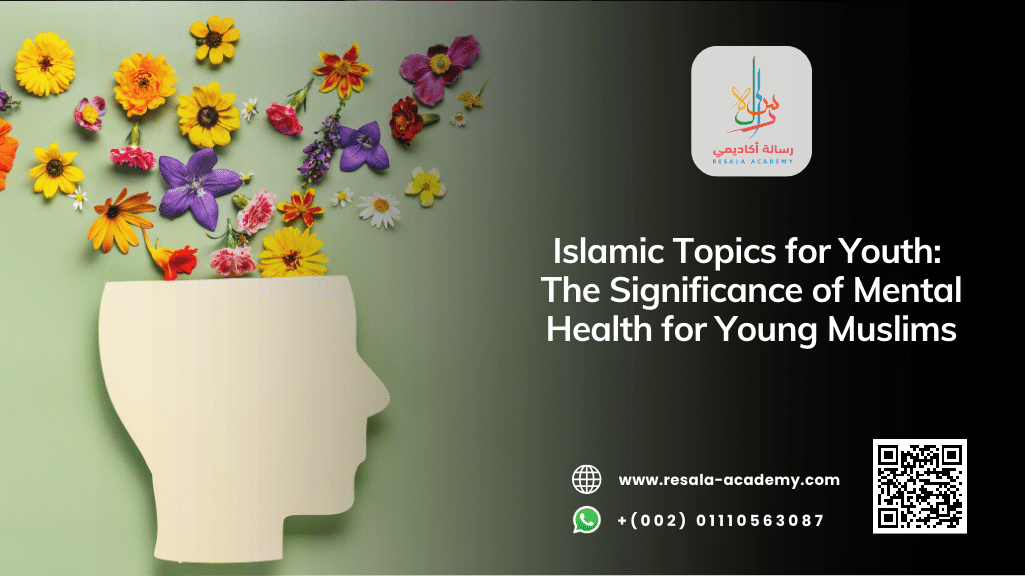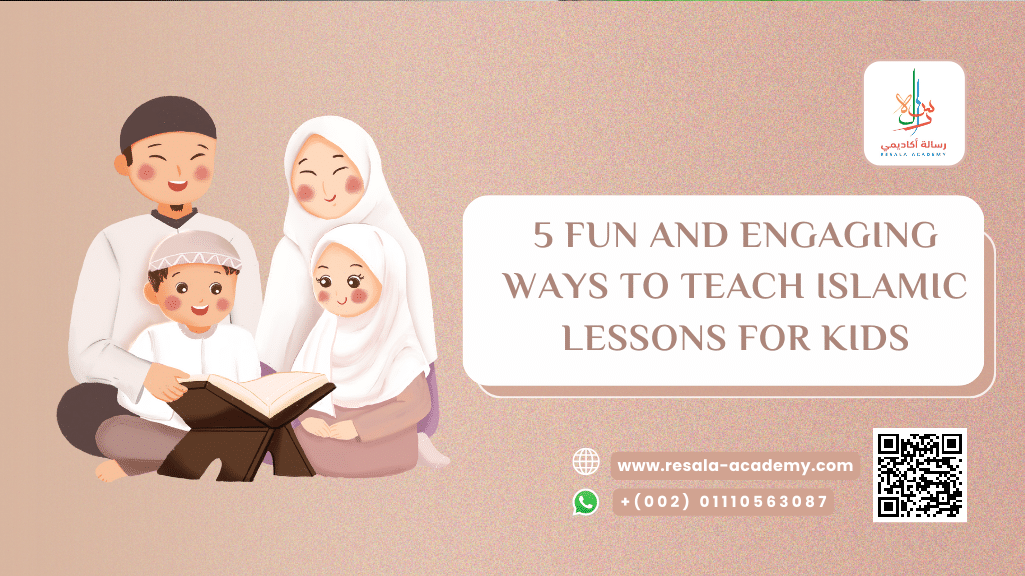Table of Contents
Islamic Topics for Youth: The Significance of Mental Health for Young Muslims
Welcome to Resala Academy’s blog, where we delve into the vibrant world of Islamic topics for youth. Today, we are diving headfirst into a topic that is often overlooked but oh-so-important: mental health for young Muslims. In a world that never seems to slow down and where stress and anxiety can easily creep in, our Muslim youth must prioritize their mental well-being.
Islam has always emphasized the importance of taking care of one’s physical, emotional, and spiritual health. The teachings of Islam provide valuable guidance on how young Muslims can navigate the ups and downs of life while maintaining sound mental health. Join us as we explore common mental health issues affecting young Muslims, break down stigmas surrounding seeking help, and offer practical tips on improving your overall well-being according to Islamic principles.
So grab a cup of tea or coffee (or even some dates if you’re feeling extra authentic) because we’re about to embark on an enlightening journey towards understanding the significance of mental health for our beloved young Muslim community! Let’s dive in together with open hearts and minds!
The concept of mental health in Islamic teachings
The concept of mental health in Islamic teachings is a topic that holds great significance for young Muslims today. Islam places great emphasis on the well-being of individuals, both physically and mentally. It recognizes that mental health plays a vital role in one’s overall quality of life and spiritual development.
In Islamic teachings, maintaining good mental health involves nourishing the soul through acts of worship, seeking knowledge, practicing gratitude, and engaging in self-reflection. The Quran encourages believers to have patience during difficult times and to seek solace in prayer and supplication.
Islam also emphasizes the importance of seeking help when facing mental health challenges. The Prophet Muhammad (peace be upon him) taught his followers to seek guidance from knowledgeable scholars or professionals who can provide support and advice.
Furthermore, Islam promotes self-care as a means to improve mental well-being. This includes taking care of one’s physical health by eating nutritious food, exercising regularly, getting enough sleep, and avoiding harmful substances. Additionally, engaging in acts of kindness towards others is encouraged as it not only benefits society but also brings peace and contentment to oneself.
Overall, Islam teaches that mental health is a crucial aspect of a person’s life and should be given the same importance as physical health. It encourages individuals to have a positive mindset, seek help when needed, and engage in practices that promote inner peace and contentment. By following these teachings, Muslims can strive towards holistic well-being and a strong connection with their faith.
Common mental health issues affecting young Muslims
Common mental health issues can affect anyone, regardless of their religious affiliation. However, young Muslims may face unique challenges that contribute to these issues. The pressures of balancing faith, culture, and societal expectations can take a toll on their mental well-being.
One common issue is anxiety, which can stem from various sources such as academic stress or the fear of not living up to religious expectations. Depression is another prevalent condition among young Muslims, often linked to feelings of isolation or struggling with identity conflicts between traditional values and modern society.
Body image concerns also impact many young Muslims due to cultural standards emphasizing modesty and ideals of beauty. This pressure can lead to low self-esteem and unhealthy habits related to appearance. Additionally, navigating relationships while adhering to Islamic principles may cause emotional distress for some individuals.
It’s important for us as a community to recognize these challenges and provide support systems that address the specific needs of our youth. By fostering open conversations about mental health within Islamic spaces and encouraging professional help when needed, we can create an environment in which young Muslims feel understood and supported in their journey towards better mental well-being.
Remember that everyone’s experiences are different, so it’s crucial not to generalize or stigmatize those facing mental health issues within the Muslim community. Together, we can work towards breaking down barriers and creating an inclusive space where all individuals feel comfortable seeking the help they need without judgment or shame.
Stigmas and barriers Preventing Youth from seeking help
Let’s face it – mental health can be a challenging topic to discuss, especially within certain cultural or religious communities. Unfortunately, this is also true for many young Muslims who may face unique stigmas and barriers when it comes to seeking help for their mental well-being.
One common barrier is the fear of being judged or labeled as weak. In some cultures, there is an expectation that individuals should be able to handle their problems on their own without seeking external support. This can create immense pressure on young Muslims who may feel ashamed or embarrassed about reaching out for help.
Another barrier lies in the misconception that mental health issues are solely spiritual and can be solved through prayer alone. While faith undoubtedly plays a crucial role in healing, it is essential to understand that professional assistance such as counseling or therapy can complement one’s spiritual journey toward recovery.
Additionally, the lack of awareness surrounding available resources contributes to the stigma around mental health among Muslim youth. Many individuals may not even know where to seek help or what services are accessible within their community. By increasing education and promoting open conversations about mental health, we can break down these barriers and provide much-needed support for young Muslims struggling with their well-being.
Remember, addressing mental health concerns requires compassion, understanding, and empathy from both individuals experiencing challenges themselves and those around them. It’s time we dismantle these stigmas together so that our youth feel empowered to prioritize their mental well-being without judgment or shame!
How to take care of one’s mental health according to Islam
Taking care of one’s mental health is crucial for overall well-being, and Islam provides valuable guidance on this matter. Here are some essential bullet points on how to nurture your mental health according to Islamic teachings:
1. Connect with Allah: Strengthen your relationship with Allah through regular prayer, recitation of the Quran, and supplication. Seek solace in His words and find peace in His remembrance.
2. Practice gratitude: Expressing gratitude to Allah for His blessings can help shift your focus from negative thoughts to positive ones. Reflect daily on the countless blessings you have been bestowed with.
3. Seek knowledge: Learn more about Islam and its teachings as it will provide you with a sense of purpose and understanding. Attend religious lectures, read books by scholars, or enroll in online courses that deepen your knowledge.
4. Maintain a balanced lifestyle: Take care of your physical health by eating nutritious food, getting enough sleep, and engaging in regular exercise while also finding time for relaxation activities like reading or spending time outdoors.
Always remember that taking care of yourself is an act of worship in Islam. By prioritizing your mental well-being along with spiritual growth, you can lead a fulfilling life guided by the principles of Islam.
Practical tips for improving mental health as a young Muslim
1. Seek spiritual solace: Nurture your connection with Allah (SWT) through regular prayer, recitation of the Quran, and engaging in acts of worship. The peace and tranquility found in these practices can provide comfort during challenging times.
2. Prioritize self-care: Take care of yourself physically, emotionally, and mentally. Get enough sleep, eat nutritious meals, exercise regularly, and engage in activities that bring you joy and relaxation.
3. Build a support system: Surround yourself with positive influences who share your faith values. Reach out to friends or family members who understand your struggles and can offer support when needed.
4. Seek knowledge: Educate yourself about mental health conditions and learn coping strategies from trusted Islamic sources or mental health professionals who respect your religious beliefs.
Remember, taking care of your mental health is not only essential for your overall well-being but also strengthens your relationship with Allah (SWT). Embrace these practical tips to nurture a healthy mind while staying true to Islamic teachings.
Resources and support available for Muslim youth struggling with mental health issues
If you or someone you know is a young Muslim struggling with mental health issues, it’s essential to remember that help and support are available. Islamic communities recognize the importance of mental well-being and have developed resources specifically tailored for Muslim youth facing these challenges.
1. Online Support: In today’s digital age, there are numerous online platforms dedicated to providing support and guidance to young Muslims dealing with mental health issues. These platforms offer anonymous chat services, discussion forums, articles, and videos addressing various topics related to mental health from an Islamic perspective.
2. Counseling Services: Many mosques and Islamic organizations now provide counseling services that combine faith-based principles with professional therapeutic approaches. These counselors understand the unique struggles faced by young Muslims and can offer guidance in navigating both the religious and psychological aspects of their lives.
3. Mental Health Workshops: Islamic centers often organize workshops focused on promoting mental well-being among youth. These workshops may cover topics such as stress management techniques, building resilience through spirituality, coping strategies based on Quranic teachings, and understanding the importance of self-care.
4. Community Support Groups: Joining local support groups can be incredibly beneficial for Muslim youth experiencing mental health difficulties. These groups provide a safe space where individuals can share their experiences openly without fear of judgment or stigma while receiving encouragement from others who have gone through similar struggles.
Remember that seeking help is not a sign of weakness but rather an act of strength and courage! It’s important to reach out to these resources available within your community as they can offer valuable guidance during challenging times.
Learn More about Islamic Topics for Youth with Resala Academy
Are you a young Muslim looking to explore and delve deeper into Islamic topics? Look no further than Resala Academy! This amazing institution is dedicated to providing comprehensive courses and resources for youth interested in learning more about Islam. With a wide range of subjects available, from Quranic studies to the life of Prophet Muhammad (PBUH), Resala Academy offers an enriching experience that will help expand your knowledge and understanding.
At Resala Academy, you’ll have access to expert instructors who are passionate about teaching Islamic topics in an engaging and relatable manner. They understand the unique challenges faced by young Muslims today and strive to make the material accessible and relevant. Whether you’re just starting your journey or seeking advanced studies, there’s something for everyone at this renowned academy.
In addition to its exceptional educational programs, Resala Academy also provides a supportive community where like-minded individuals can connect. You’ll have the opportunity to engage in discussions, share insights, and build lasting friendships with fellow students who are equally passionate about exploring Islamic topics.
With its commitment to excellence in education and fostering a sense of community among young Muslims, Resala Academy is truly an invaluable resource for those seeking knowledge on various Islamic subjects. Take advantage of this incredible opportunity today! Explore their website or reach out directly for more information on how you can get involved with Resala Academy’s offerings tailored specifically for youth like yourself.
FAQs
1. Can mental health issues coexist with religious beliefs?
Absolutely! Mental health is a universal concern that knows no boundaries of faith or religion. It is important to remember that Islam emphasizes the importance of seeking knowledge and understanding, including the awareness and management of one’s mental well-being.
2. Is it possible to balance spirituality and mental health?
Definitely! Spirituality can serve as a powerful tool in enhancing one’s mental health. Engaging in acts of worship, such as prayer, reading Quranic verses, or connecting with fellow believers through Islamic organizations, can bring solace and peace to the mind.
3. Are there any specific Islamic practices for improving mental health?
Yes! Islam provides various practical guidelines for maintaining good mental health. These include regular prayers (Salah), recitation of supplications (Duas) for stress relief, seeking forgiveness from Allah (Istighfar), engaging in acts of charity (Sadaqah), practicing gratitude towards God and others, and fostering strong social connections within the Muslim community.
4. Where can I find support if I am struggling with my mental health?
There are numerous resources available for young Muslims facing challenges related to their mental well-being. Seek guidance from trusted elders or family members who understand your cultural context and may provide emotional support or recommend professional help if needed.
Conclusion
In this fast-paced and ever-changing world, the significance of mental health for young Muslims cannot be overstated. We must recognize and address the common mental health issues faced by our youth, such as anxiety, depression, and stress. By breaking down stigmas and barriers surrounding seeking help, we can create a supportive environment where young Muslims feel comfortable reaching out for assistance.
Fortunately, Islam offers guidance on how to take care of one’s mental health. Through prayer, self-reflection, seeking knowledge, maintaining good company, and practicing gratitude among other things; young Muslims can nurture their well-being in alignment with their faith.
Remember that improving mental health is a journey that requires effort and perseverance. Start small by incorporating practical tips into your daily routine like engaging in physical activity or taking time for self-care activities. Seek support from trusted individuals within your community or consider utilizing resources specifically designed to cater to Muslim youth struggling with mental health issues.
At Resala Academy, we understand the unique challenges faced by young Muslims today. Our platform provides educational content on Islamic topics for youth covering various aspects including mental health awareness. We strive to empower the next generation with knowledge rooted in Islamic teachings so they can navigate life while staying true to their beliefs.
Together, let us work towards creating an inclusive society where the well-being of every individual is valued regardless of age or background. By prioritizing mental health among our youth population and offering them support along their journey towards wholeness both physically and spiritually; we can build a stronger future filled with hope, resilience, and thriving Muslim communities worldwide.
Remember: Your mind matters! Take care of it through faith-inspired practices while also seeking professional help when needed.




